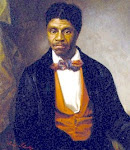Six years studying and experiencing everying I possibly could about Dred Scott.
 I have walked among the cotton fields and through the marshy swamps listening to the cicadas and feeling the wet heat of “The Olde Place” plantation in Southampton County VA where Dred was born “Sam Blow.”
I have walked among the cotton fields and through the marshy swamps listening to the cicadas and feeling the wet heat of “The Olde Place” plantation in Southampton County VA where Dred was born “Sam Blow.”
I have knelt in prayer at the slave cemetery, where Sam’s brother “Dred” is buried, on the wide open grass campus of College in Hunstville, Alabama, which was cleared from the surrounding forests by Dred and his fellow slaves of Peter Blow. I’ve heard the music in my soul as I read the words of the slave prayer on the marker there: “Deep River, my home is over Jordan, Deep River, Lord; I wand to Pass over to Camp Ground.”
 I twisted my ankle on the very same uneven bricks of the riverboat quay in St. Louis that Dred trudged up and down thousands of times as a porter to the Blow’s Jefferson Hotel. I have ridden the steamboats and swam in muddy and turbulent waters of the “Father of Waters” – the Mighty Mississippi.
I twisted my ankle on the very same uneven bricks of the riverboat quay in St. Louis that Dred trudged up and down thousands of times as a porter to the Blow’s Jefferson Hotel. I have ridden the steamboats and swam in muddy and turbulent waters of the “Father of Waters” – the Mighty Mississippi.
I have felt Dred’s spirit at the remains of Ft. Armstrong on Rock Island Illinois and at the cite of the home of Dred’s second master, Army Surgeon John Emerson, who secured his claim by making Dred swim across the Mississippi and building and occupying a shack on the opposite shore in Davenport, Iowa.
 I have wandered the snowy grounds of the beautifully preserved Fort Snelling in Minneapolis-St. Paul where Dred fell in love with Harriett and suffered through extreme winters. Walking under perhaps the same trees (now grow very old) whose youthful leaves might have bowed down as Dred and Harriett walked by hand in hand along the banks of the Minnessota where it flows into the Mississippi.
I have wandered the snowy grounds of the beautifully preserved Fort Snelling in Minneapolis-St. Paul where Dred fell in love with Harriett and suffered through extreme winters. Walking under perhaps the same trees (now grow very old) whose youthful leaves might have bowed down as Dred and Harriett walked by hand in hand along the banks of the Minnessota where it flows into the Mississippi.
I have spent many hours in the halls and courtrooms of the Old Missouri Courthouse where Dred won then lost his freedom, and on the Eastern Steps where slave auctions took place.

And I have wept at the grave of Dred Scott at Calvary Cemetery.
I have done all this and yet I feel inadequate and unworthy. But can any of us really understand. Should we even try?
Become Free - then lose it.
Come back with me to 1852 St. Louis.
Read Chapters One and Two of my new novel, Am I Not A Man? The Dred Scott Story.



